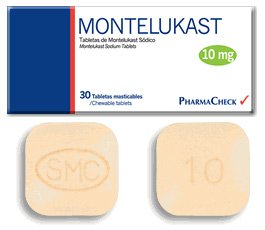Montelukast found to Cause higher rates of adverse drug reactions (ADRs)
 A common pharmaceutical used for asthma, montelukast, was found to cause significantly higher rates of adverse drug reactions (ADRs) than other asthma medications.1 Montelukast is a leukotriene receptor antagonist that is administered as a tablet for the prevention of asthma and other allergy related symptoms. The drug is known to cause neuropsychiatric symptoms, and carries an FDA mandated black box warning to this effect. The current study looked at how prevalent these ADRs are in clinical practice.
A common pharmaceutical used for asthma, montelukast, was found to cause significantly higher rates of adverse drug reactions (ADRs) than other asthma medications.1 Montelukast is a leukotriene receptor antagonist that is administered as a tablet for the prevention of asthma and other allergy related symptoms. The drug is known to cause neuropsychiatric symptoms, and carries an FDA mandated black box warning to this effect. The current study looked at how prevalent these ADRs are in clinical practice.
Study Included Analysis of children aged 1-17 who initiated therapy with montelukast
Specifically, the study conducted a retrospective cohort analysis of children aged 1-17 who initiated therapy with montelukast, and who discontinued the use of the drug for the specific reason of neuropsychiatric symptoms arising from its use. Children initiated on montelukast as a monotherapy or in combination with inhaled corticosteroids (ICS) were matched to children initiated on ICS as a monotherapy. Parents of children were interviewed to assess the occurrence of any ADRs with any asthma medication. The total study size was 106 children (58% male, 62% caucasian, median age of 5 years.
Incidence of Drug Cessation due to Neuropsychiatric ADRs Ocurred within 2 Weeks of Therapy
The incidence of drug cessation due to neuropsychiatric ADRs was between 16 (10-26)%, occurring primarily within 2 weeks of therapy initiation. The most frequent ARDs cited were irritability, aggression, and sleep disturbances. The relative risk of neuropsychiatric ADRs associated with montelukast was 12 (2-90) compared to ICS. The conclusion of the study was that “In the real-life setting, asthmatic children initiated on montelukast experience a notable risk of neuropsychiatric ADRs leading to drug cessation, that is significantly higher than that associated with ICS.”
Source
- Benard B, Bastien V, Vinet B, Yang R, Krajinovic M, Ducharme FM. Neuropsychiatric adverse drug reactions in children initiated on montelukast in real-life practice. Eur Respir J. 2017;50(2)
Image Copyright: <a href=’https://www.123rf.com/profile_megaflopp’>megaflopp / 123RF Stock Photo</a>
 Node Smith, ND, is a naturopathic physician in Portland, OR and associate editor for NDNR. He has been instrumental in maintaining a firm connection to the philosophy and heritage of naturopathic medicine among the next generation of docs. He helped found the first multi-generational experiential retreat, which brings elders, alumni, and students together for a weekend camp-out where naturopathic medicine and medical philosophy are experienced in nature. Four years ago he helped found the non-profit, Association for Naturopathic ReVitalization (ANR), for which he serves as the board chairman. ANR has a mission to inspire health practitioners to embody the naturopathic principles through experiential education. Node also has a firm belief that the next era of naturopathic medicine will see a resurgence of in-patient facilities which use fasting, earthing, hydrotherapy and homeopathy to bring people back from chronic diseases of modern living; he is involved in numerous conversations and projects to bring about this vision.
Node Smith, ND, is a naturopathic physician in Portland, OR and associate editor for NDNR. He has been instrumental in maintaining a firm connection to the philosophy and heritage of naturopathic medicine among the next generation of docs. He helped found the first multi-generational experiential retreat, which brings elders, alumni, and students together for a weekend camp-out where naturopathic medicine and medical philosophy are experienced in nature. Four years ago he helped found the non-profit, Association for Naturopathic ReVitalization (ANR), for which he serves as the board chairman. ANR has a mission to inspire health practitioners to embody the naturopathic principles through experiential education. Node also has a firm belief that the next era of naturopathic medicine will see a resurgence of in-patient facilities which use fasting, earthing, hydrotherapy and homeopathy to bring people back from chronic diseases of modern living; he is involved in numerous conversations and projects to bring about this vision.


